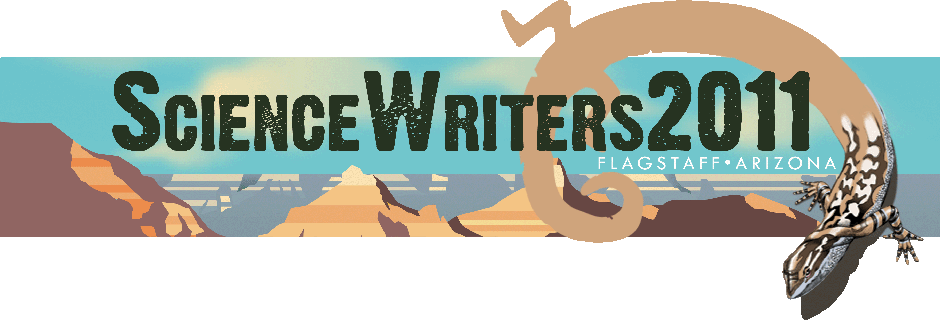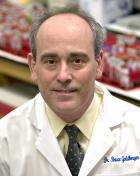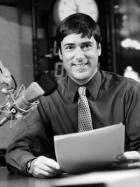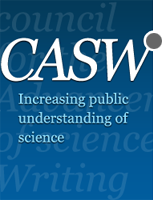Speakers
Dan Ferber
Position/Organization:
Freelance writer; Co-author, Changing Planet, Changing Health
Speaking:
-
Saturday, October 15th, 10:45 am - 12:15 pm
-
Dianne Finch
Position/Organization:
Manager for New Media, Knight Science Journalism Fellowships at MIT
Speaking:
-
Saturday, October 15th, 10:45 am - 12:15 pm
-
Sheri Fink
Position/Organization:
Staff Reporter, ProPublica
Sheri Fink is a staff reporter at ProPublica in New York. She has reported on health, medicine and science in the U.S. and from every continent except Antarctica and her articles have appeared in such publications as the New York Times, Discover and Scientific American. Fink's book, War Hospital: A True Story of Surgery and Survival (Public Affairs, 2003), won the American Medical Writers Association special book award and was a finalist for the Overseas Press Club and PEN Martha Albrand awards.
Jeffrey Foster, Ph.D.
Position/Organization:
Research assistant professor, Northern Arizona University
Jeffrey Foster is a wildlife biologist specializing in infectious diseases. His studies of bats were preceded by work on work on brucellosis (it's not bison that are infecting cattle; it's elk) and on avian malaria in Hawaiian honeycreepers.
Speaking:
-
Sunday, October 16th, 8:00 am - 10:00 am
-
Douglas Fox
Position/Organization:
Freelance writer
Douglas Fox is a freelance science writer. His stories have appeared in Discover, Popular Mechanics, Esquire, New Scientist, Conservation, The Christian Science Monitor, Science News for Kids, and other publications. His work has also been published in The Best American Science and Nature Writing, and The Best Technology Writing. Much of his work focuses on neuroscience and climate change; his reporting has taken him to Antarctica three times since 2007.
Speaking:
-
Saturday, October 15th, 3:30 pm - 5:00 pm
-
Peter Friederici
Position/Organization:
Assistant Professor, Journalism, School of Communication, Northern Arizona University
Organizing:
-
Friday, October 14th, 9:00 am - 5:00 pm
-
Friday, October 14th, 9:00 am - 5:00 pm
-
Peggy Girshman
Position/Organization:
Executive Editor, Kaiser Health News; Vice President, National Association of Science Writers
Organizing:
-
Saturday, October 15th, 9:15 am - 10:30 am
Moderating:
-
Bruce Goldberger
Position/Organization:
Professor of Pathology and Director of Toxicology, University of Florida College of Medicine; Director, William R. Maples Center for Forensic Medicine
Dr. Goldberger is a Professor and Director of Toxicology in the Department of Pathology, Immunology and Laboratory Medicine in the College of Medicine at the University of Florida in Gainesville. He holds a joint Clinical Professor position in the Department of Psychiatry in the College of Medicine. Dr. Goldberger is also the Director of the William R. Maples Center for Forensic Medicine and Program Director for the Florida Emergency Mortuary Operations Response System.
Speaking:
-
Saturday, October 15th, 10:45 am - 12:15 pm
-
Denise Graveline
Position/Organization:
don't get caught
Denise Graveline is a communications consultant and public speaking coach based in Washington, DC, whose consultancy is called don't get caught because she helps make sure you don't get caught speechless, unprepared or behind the curve. She has spent entirely too much time in her career working with scientists and science writers, having directed media relations or communications for places like the Robert Wood Johnson Foundation, AAAS and the American Chemical Society, and as the Deputy Associate Administrator for Communications, Education and Public Affairs at the U.S.
Richard Harris
Position/Organization:
Science Correspondent, National Public Radio
Award-winning journalist Richard Harris reports on science issues for NPR's newsmagazines Morning Edition, All Things Considered, and Weekend Edition. Harris, who joined NPR in 1986, has traveled to the ends of the earth for NPR. His reports have originated from Timbuktu, the South Pole, the Galapagos Islands, Beijing during the SARS epidemic, the center of Greenland, the Amazon rain forest and the foot of Mt. Kilimanjaro (for a story about tuberculosis). In 2010, Harris' reporting uncovered that the blown-out BP oil well in the Gulf of Mexico was spewing out far more oil than asserted in the official estimates. He covered the United Nations climate negotiations, starting with the Earth Summit in Rio de Janeiro in 1992, followed by Kyoto in 1997 and Copenhagen in 2009.
Speaking:
-
Saturday, October 15th, 3:30 pm - 5:00 pm
-






